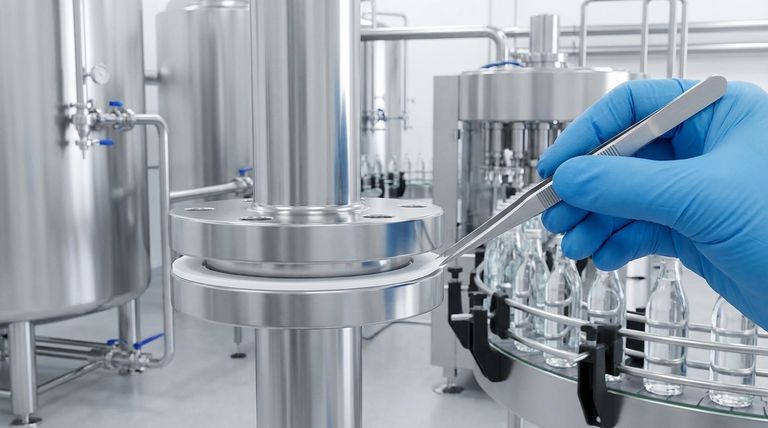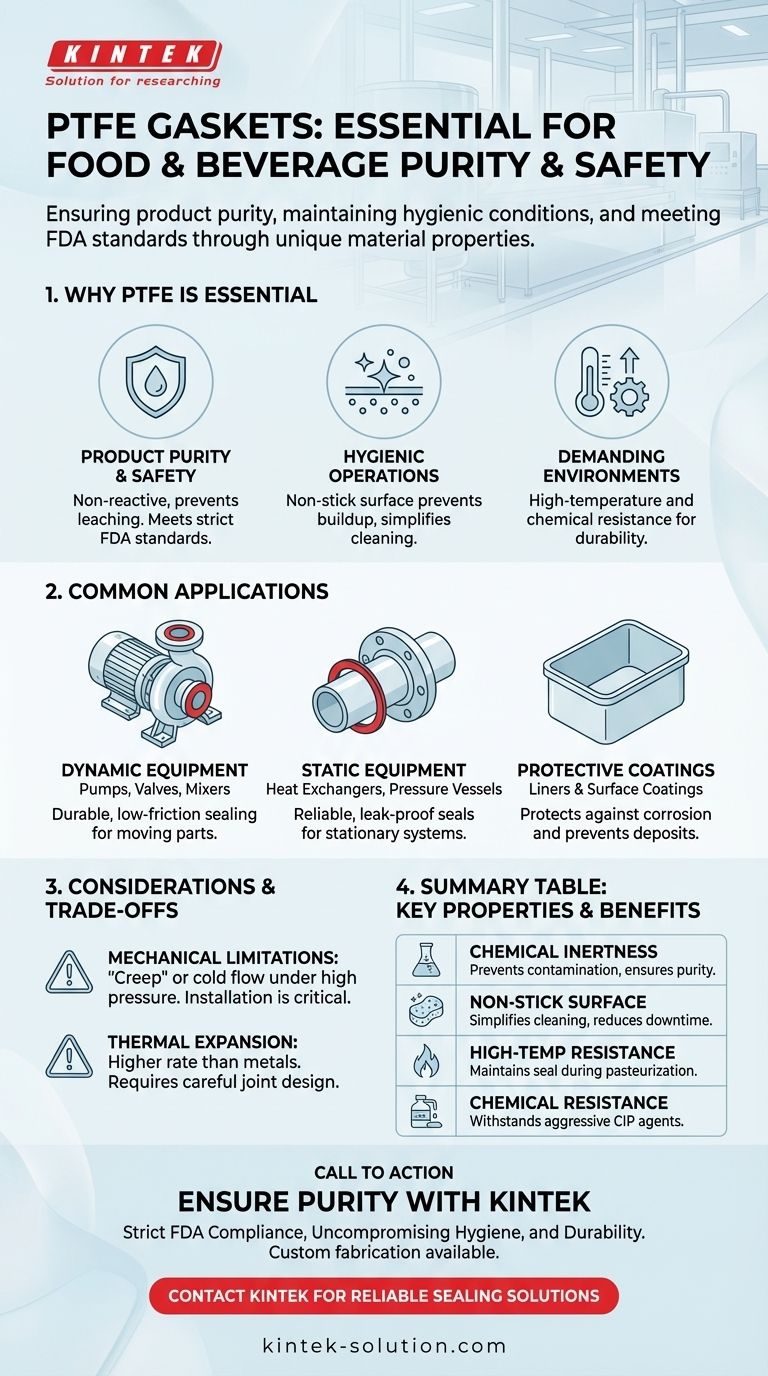In short, PTFE gaskets are essential sealing components in the food and beverage industry, chosen for their unique ability to ensure product purity and maintain hygienic operating conditions. Their non-stick, chemically inert, and temperature-resistant properties prevent contamination and withstand rigorous processing environments, making them compliant with strict FDA safety standards.
The core value of PTFE in food and beverage applications is not just its ability to form a seal, but its material properties that actively prevent contamination. This makes it a foundational component for ensuring both food safety and operational efficiency.

Why PTFE is Essential for Food & Beverage Processing
The suitability of Polytetrafluoroethylene (PTFE) for this industry stems from a specific combination of material characteristics. Each property directly addresses a critical challenge in food production, from safety and hygiene to equipment durability.
Ensuring Product Purity and Safety
A primary concern in food processing is preventing any foreign material from leaching into the product. PTFE's chemical inertness makes it non-reactive.
This means it will not react with acidic ingredients, oxidizing agents, or other food components, ensuring the final product's taste, smell, and composition remain unaltered. This non-reactive nature is a key reason PTFE meets stringent FDA standards for food-contact materials.
Maintaining Hygienic Operations
The surfaces of processing equipment must be kept free of residue to prevent bacterial growth and cross-contamination. PTFE is renowned for its non-stick surface.
This property prevents food particles, grease, and other materials from adhering to the gasket. This not only prevents deposit buildup that can reduce equipment efficiency but also makes cleaning processes faster and more effective, upholding high sanitation standards.
Withstanding Demanding Environments
Food and beverage processing involves extreme conditions, including high temperatures for pasteurization and sterilization, as well as aggressive chemical cleaning agents.
PTFE gaskets exhibit excellent high-temperature tolerance, allowing them to maintain a reliable seal without degrading. Their strong chemical resistance ensures they are not damaged by the caustic or acidic solutions used for clean-in-place (CIP) procedures.
Common Applications in Processing Equipment
PTFE's versatility allows it to be used in various critical points within the food and beverage production line, from dynamic machinery to static connections.
Sealing in Dynamic Equipment
In machinery with moving parts, PTFE provides a durable, low-friction seal. It is commonly found in pumps, valves, and mixers.
Here, the gasket prevents leaks while minimizing wear and tear on moving components. In applications like non-metal bearings, it provides a long-lasting, grease-free solution that eliminates a potential source of contamination.
Sealing in Static Equipment
PTFE gaskets create reliable, leak-proof seals in stationary equipment where maintaining pressure and temperature is critical.
They are widely used in heat exchangers, pressure vessels, and pipe flanges. By preventing leaks, they ensure both operational safety and the integrity of the product passing through the system.
Protective Coatings and Liners
Beyond traditional gaskets, PTFE is used as a coating for equipment surfaces and containers. It protects against corrosion from acidic foods and beverages.
This application is also seen in bottling equipment, where a PTFE coating prevents deposits from building up and disrupting the filling process.
Understanding the Trade-offs and Considerations
While PTFE is an exceptional material, no single solution is perfect for every scenario. A clear understanding of its properties is crucial for proper implementation.
Mechanical Limitations
PTFE is a relatively soft material susceptible to "creep" or cold flow. Under high mechanical pressure and sustained bolt load, the gasket material can slowly deform over time, potentially leading to a loss of sealing pressure.
This characteristic means that installation procedures are critical. Over-tightening a PTFE gasket can damage it and cause a premature failure.
Thermal Expansion
PTFE has a higher coefficient of thermal expansion than metals. In applications with wide temperature fluctuations, this must be accounted for in the joint design to ensure a consistent seal is maintained across the entire operating range.
Making the Right Choice for Your Goal
Selecting the right gasket material is a critical decision that impacts safety, efficiency, and product quality. PTFE is often the superior choice when specific outcomes are prioritized.
- If your primary focus is regulatory compliance and hygiene: PTFE's FDA-compliant, non-reactive, and non-stick properties make it the definitive choice for preventing contamination.
- If your primary focus is equipment longevity in harsh conditions: PTFE’s robust resistance to high temperatures and aggressive cleaning chemicals ensures seal integrity and reduces maintenance frequency.
- If your primary focus is operational efficiency: PTFE's non-stick surface simplifies cleaning protocols, significantly reducing the downtime required between production runs.
Ultimately, using PTFE gaskets is a foundational step in building a safe, efficient, and reliable food and beverage processing operation.
Summary Table:
| Key Property | Benefit in Food & Beverage Industry |
|---|---|
| Chemical Inertness | Prevents contamination, ensures product purity, and meets FDA standards. |
| Non-Stick Surface | Simplifies cleaning, prevents bacterial growth, and reduces downtime. |
| High-Temperature Resistance | Maintains seal integrity during pasteurization and sterilization processes. |
| Chemical Resistance | Withstands aggressive cleaning agents used in CIP procedures. |
Ensure the purity and safety of your food and beverage products with high-performance PTFE components from KINTEK.
As a leading manufacturer of precision PTFE seals, liners, and labware, we understand the critical demands of the semiconductor, medical, laboratory, and industrial sectors. For the food and beverage industry, this translates to components that guarantee:
- Strict Compliance: Our PTFE materials meet FDA standards for food-contact applications.
- Uncompromising Hygiene: Non-stick, chemically inert surfaces prevent contamination and simplify cleaning.
- Durability: Excellent resistance to high temperatures and harsh chemicals ensures long-lasting performance.
We specialize in custom fabrication, from prototypes to high-volume orders, ensuring a perfect fit for your specific equipment and processing needs.
Contact KINTEK today to discuss your application and receive a quote for reliable, contamination-free sealing solutions.
Visual Guide

Related Products
- Custom PTFE Parts Manufacturer for Teflon Parts and PTFE Tweezers
- Custom PTFE Parts Manufacturer for Teflon Containers and Components
- Customizable PTFE Seals Filter Holders for Versatile Applications
- Custom PTFE Sleeves and Hollow Rods for Advanced Applications
- Custom PTFE Sealing Tapes for Industrial and High Tech Applications
People Also Ask
- What factors should be considered when choosing between Nylon and PTFE? Select the Right Material for Your Application
- What are the unique properties of PTFE? Unlock Unmatched Performance in Demanding Applications
- What finishing techniques are effective for machined Teflon parts? Achieve Functional Performance and Dimensional Stability
- What fabrication services are available for PTFE? Shearing, Stamping, Laser Cutting, Molding & Machining
- What are the main applications of PTFE type Teflon? Unlock Its Versatility for Your Industry



















